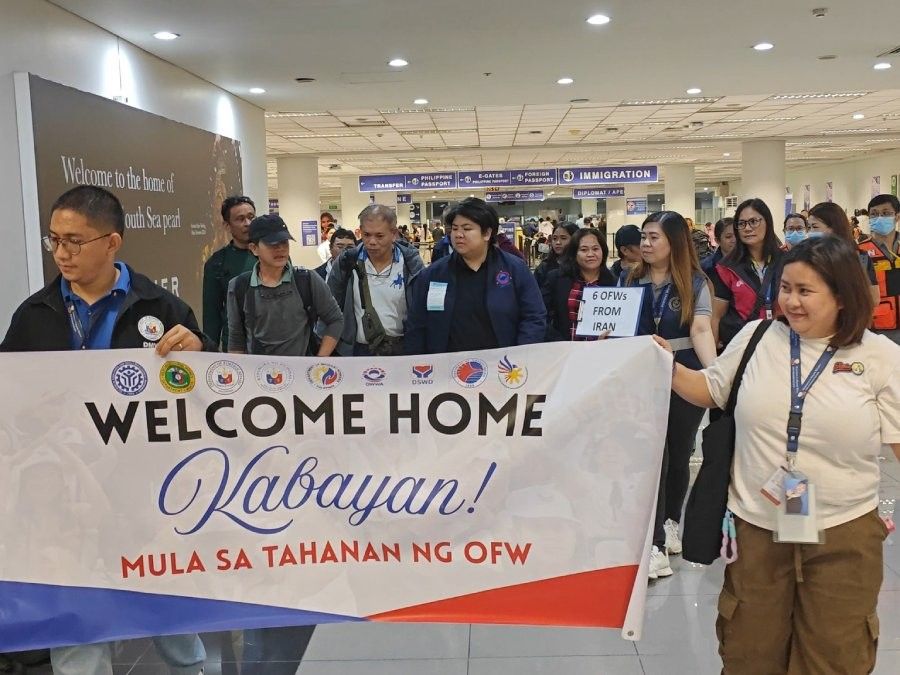
Upgrade to High-Speed Internet for only ₱1499/month!
Enjoy up to 100 Mbps fiber broadband, perfect for browsing, streaming, and gaming.
Visit Suniway.ph to learn
Lawyer Salvador Medialdea (L) sits in the courtroom during the first appearance via video link of his client former Philippine President Rodrigo Duterte (seen on a screen) before the International Criminal Court (ICC) on charge of crimes against humanity over his deadly crackdown on narcotics, in The Hague on March 14, 2025. The 79-year-old, the first ex-Asian head of state to face charges at the ICC, followed by videolink during a short hearing to inform him of the crimes he is alleged to have committed, as well as his rights as a defendant. Duterte stands accused of the crime against humanity of murder over his years-long campaign against drug users and dealers that rights groups said killed thousands. AFP / Peter Dejong / Pool
AFP / Peter Dejong / Pool
MANILA, Philippines — The defense counsel of detained former President Rodrigo Duterte has requested the International Criminal Court (ICC) to limit the number of victims allowed to participate in the trial against him.
In a document submitted to the ICC registry on April 7, Duterte's lawyer, Nicholas Kaufman, requested that the court limit the types of victim identification documents accepted, proposing that only national IDs or current Philippine passports be allowed. He said that this would "streamline proceedings" and enforce "a more stringent approach.
“Limiting the range of identity documents enhances the reliability of the identity verification process and significantly reduces the risk of fraud. The use of varied and insufficiently verified identity documents could lead to misidentification, double-counting, and the inclusion of false victims – issues that could trigger unnecessary and time-consuming litigation,” the document read.
If neither a national ID nor a current Philippine passport is available, Kaufman suggested that the court accept valid IDs recognized by the Social Security System in a phased manner.
“The Registry fails to explain why such deviation is appropriate or even necessary in this case, other than the vague assertion that there exists a ‘backlog in the distribution of national identity (ID) cards,’” the document read.
For ICC Assistant to Counsel Kristina Conti, Kaufman’s submission to the pre-trial chamber concerning victim participation is “out of touch and harsh” and is “intended to exclude the majority of the victims of Duterte's war on drugs.”
“Their insistence on the use of national IDs is unrealistic, with the obtention and issuance of the cards plagued with consistent issues of delay. Their suggestion to produce passports is anti-poor, as only the socially mobile have the luxury to avail of cross-country travel,” Conti said in a statement.
“Limiting the list of possible proofs of identity only discourages victims unnecessarily, almost heartlessly,” she added.
International Law expert Joel Butuyan criticized Kaufman’s comments on the types of IDs required for victim participation, pointing out that they revealed a clear lack of understanding of the Philippine context. He stressed that the documents Kaufman demanded, such as national IDs and current passports, are typically accessible only to the wealthy and privileged in the Philippines.
Butuyan emphasized that the types of IDs being demanded by Kaufman were documents that signified wealth and privilege in the Philippines, which were inaccessible to victims living in poverty and who constituted the vast majority of those killed by his client.
“The victims families have already lost loved ones. For them to be refused recognition as victims of the murderous Mr. Duterte, because of their lack of government-issued IDs, is to make them suffer grave injustice twice over,” he said in a statement.
Deaths and the drug war. On March 14 (Manila time), Duterte was presented before the ICC Pre-Trial Chamber on charges of crimes against humanity.
The charges detail his alleged involvement in at least 43 killings attributed to the Davao Death Squad and police actions during his presidency. These incidents reportedly occurred between November 1, 2011, and March 16, 2019.
Official government records report 6,000 deaths from the drug war, but human rights groups estimate the number could reach 30,000, with many victims being low-level drug users and pushers.

 2 months ago
26
2 months ago
26





